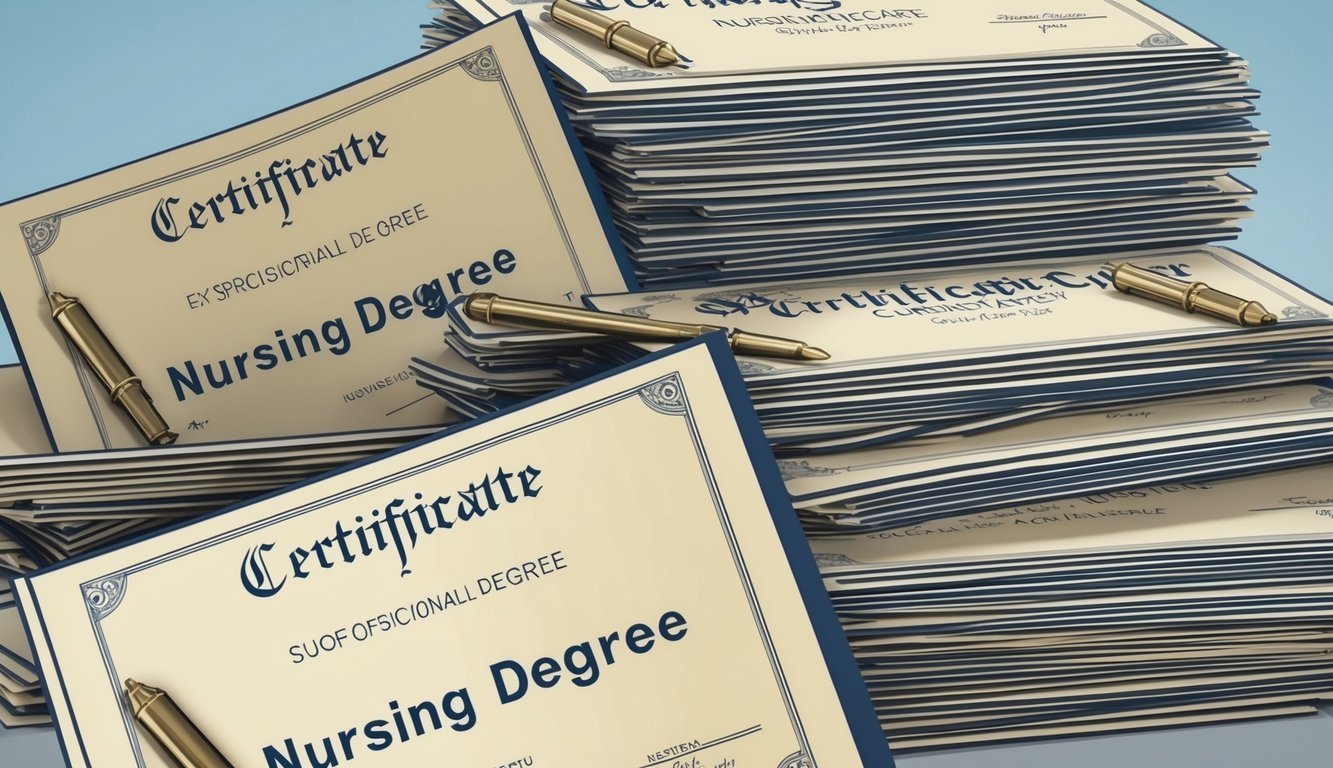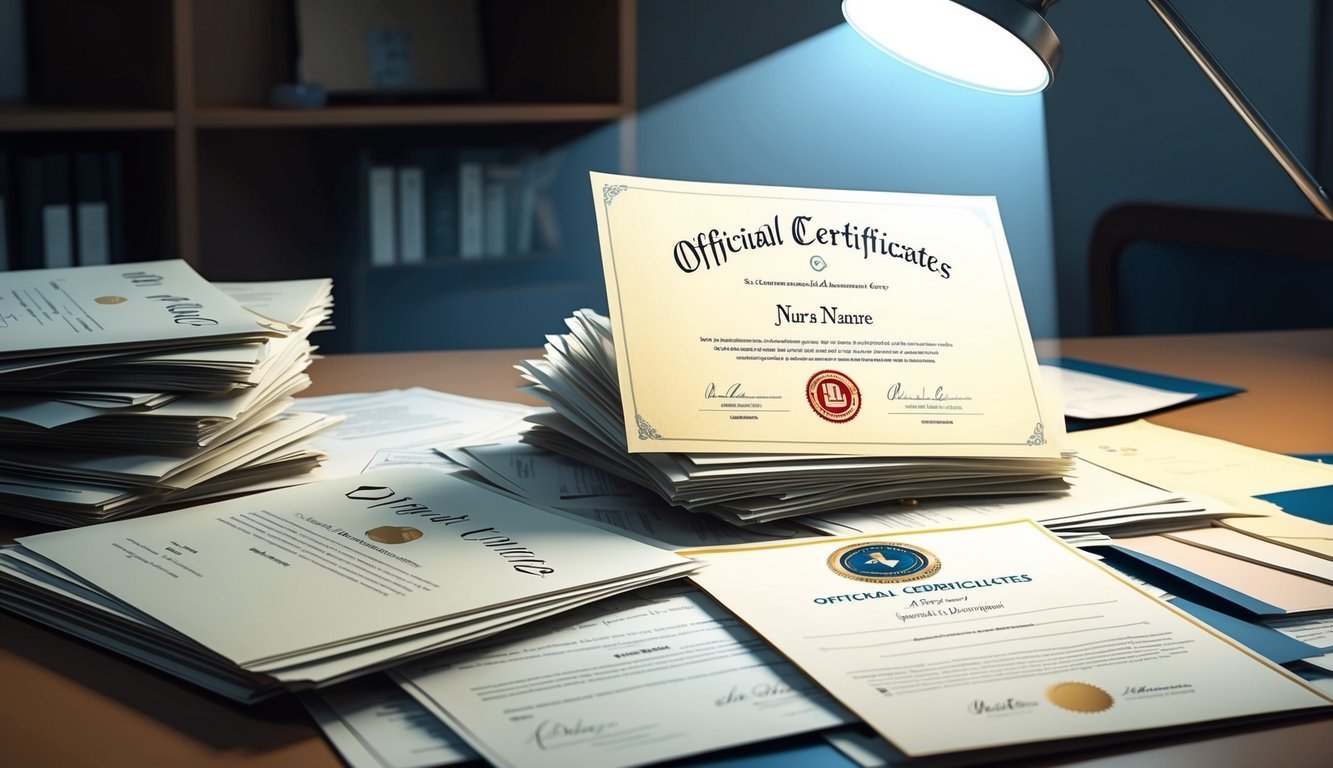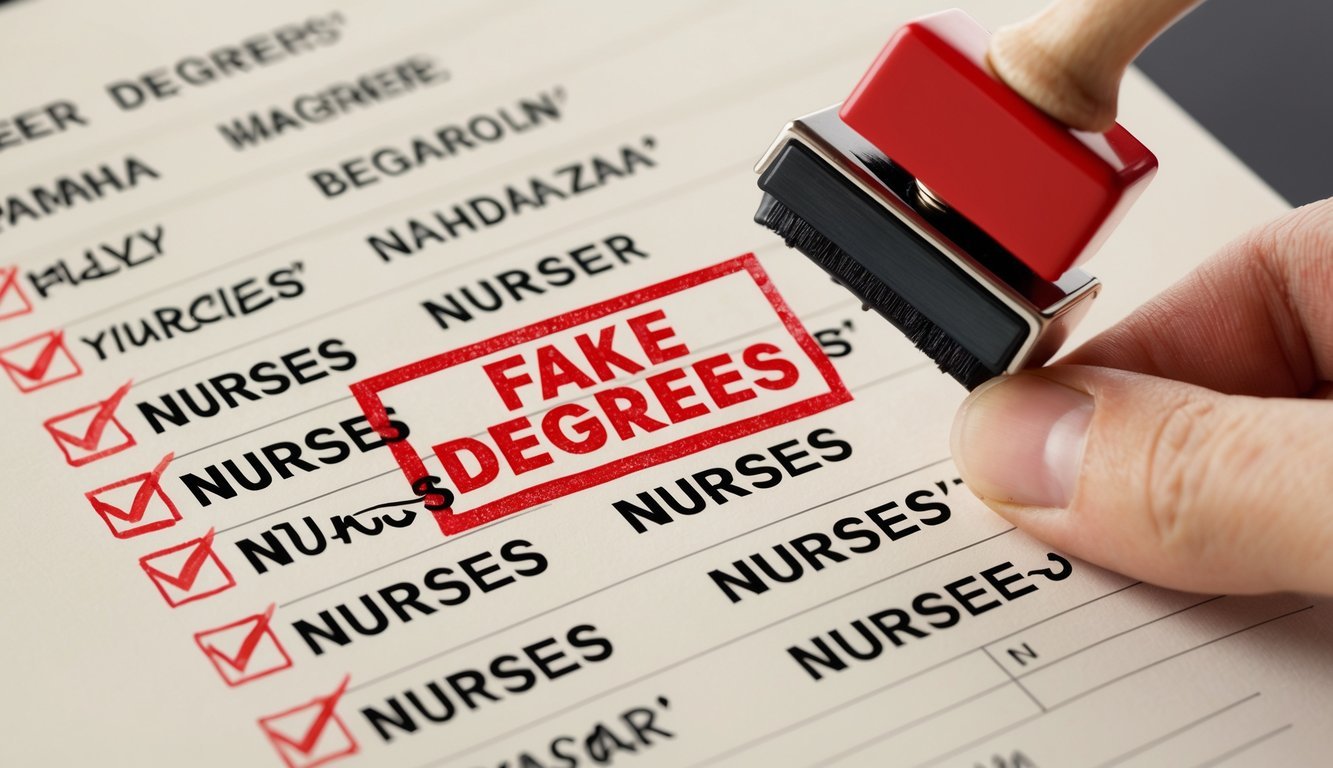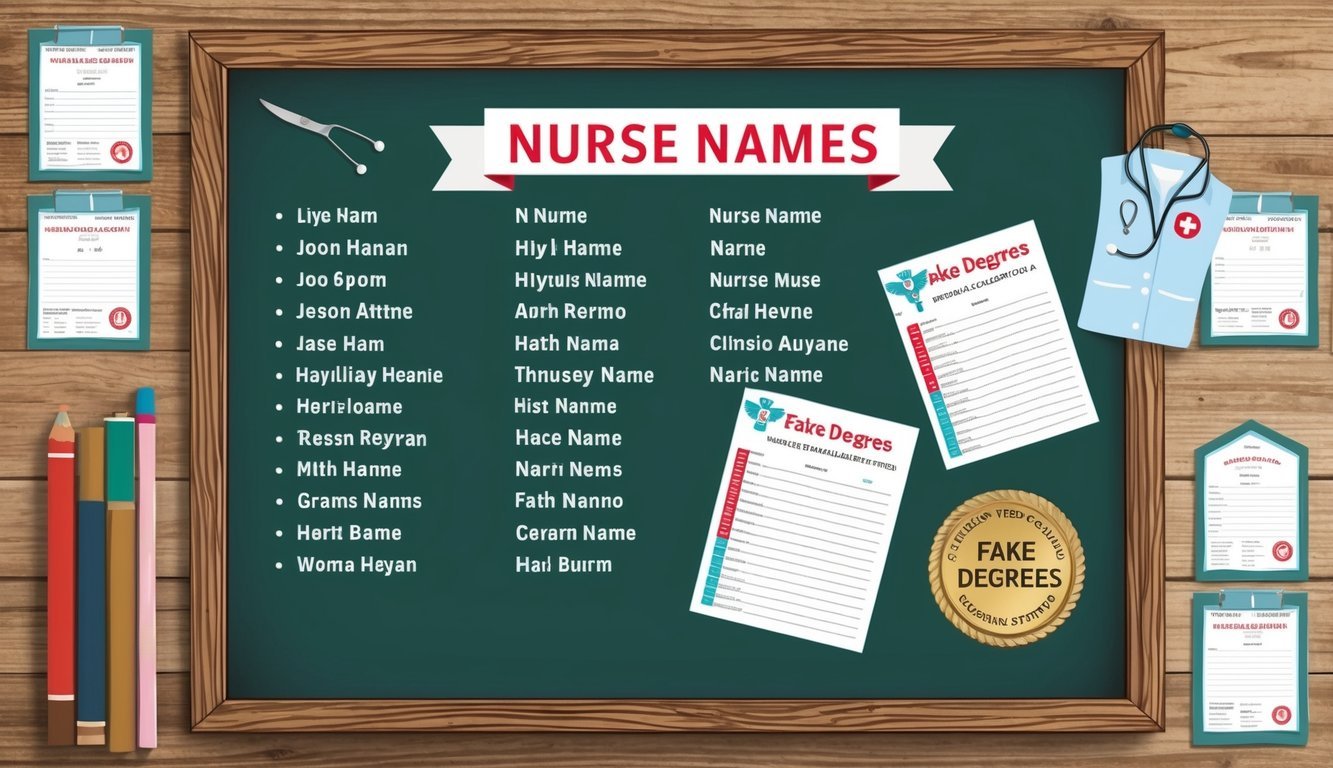Fake nursing degrees are alarming and impact not just the individuals involved but also the entire healthcare system. Numerous nurses have obtained their licenses using fraudulent diplomas, raising serious concerns about the quality of patient care and public safety. This situation poses a significant threat to the integrity of the nursing profession and can lead to unsafe practices in clinical settings.
In recent years, law enforcement has stepped up efforts to uncover these fraudulent operations, revealing shocking numbers of fake degrees issued across various institutions.
The consequences for those caught can be severe, including criminal charges and loss of licensure.
Understanding the implications of this issue is crucial for anyone concerned about the standards of care in nursing.
As you dive into the details of this scandal, you will discover not only the names of nurses tied to these fake degrees but also what actions are being taken to combat this growing problem.
This exploration sheds light on the vital importance of maintaining integrity in healthcare.
Key Takeaways
- Fake nursing diplomas threaten patient safety and care quality.
- Several institutions have been involved in selling fraudulent degrees.
- Legal actions are being taken against individuals and organizations behind these scams.
Prevalence of Fake Nursing Degrees

The issue of fake nursing degrees is serious and widespread.
Many individuals have obtained fraudulent diplomas, which not only jeopardizes their careers but also poses a significant risk to patient care.
Here are critical aspects of this problem.
Impact on Health Care Quality
Fake nursing degrees directly affect the quality of health care provided to patients.
When unqualified individuals practice nursing, they may lack essential skills and knowledge.
This gap in education can lead to incorrect diagnoses, improper medication administration, and poor patient management.
Many state boards are actively investigating cases of fraud.
For instance, nearly 7,600 nursing students were found to have graduated with fake diplomas from three Florida schools.
This situation undermines trust in the healthcare system and raises concerns about the qualifications of medical personnel.
You may wonder how many nurses have potentially unverified credentials.
Risks to Patient Safety
The presence of nurses holding fake credentials poses serious risks to patient safety.
Without proper training, these individuals may not recognize life-threatening conditions.
The consequences can be devastating, leading to preventable errors.
Healthcare fraud also strains resources dedicated to patient care.
When hospitals employ unqualified nurses, they may need to allocate additional funds to mitigate errors or retrain staff.
Such situations can also escalate costs for patients and insurance providers.
Operations Uncovering Fake Degrees
Numerous operations have targeted the sale of fake nursing degrees in the U.S. These investigations have revealed the extent of the fraud and the organizations involved.
Key agencies, including the Department of Justice and the FBI, have taken action to protect public health and safety.
Operation Nightingale
Operation Nightingale was a major initiative aimed at dismantling a large-scale fraudulent scheme involving nursing degrees.
It was led by law enforcement, including the Department of Justice and HHS-OIG.
This operation uncovered the distribution of over 7,600 fake nursing diplomas and transcripts from several former nursing schools.
These diplomas allowed individuals to apply for licenses as Registered Nurses (RNs) or Licensed Practical/Vocational Nurses (LPNs/VNs).
Such actions raised serious concerns about patient safety and the integrity of healthcare services.
The operation’s success has prompted ongoing investigations and cooperation among various state nursing boards to ensure that fraudulent practitioners are identified and removed from the workforce.
Federal Investigation Highlights
The investigation spotlighted several key points.
Thousands of individuals were implicated, with approximately 2,800 people believed to be working under false credentials from a Florida-based operation.
Investigators conducted extensive interviews and traced the sales of diplomas from three now-closed nursing schools.
Agencies involved, such as the FBI Miami and the Southern District of Florida, are working diligently to track down those who purchased these fraudulent credentials.
Efforts are ongoing to ensure that these individuals do not pose a risk to patients.
This investigation highlights the commitment to maintaining safety and ethical standards in healthcare.
Institutions Involved in Diploma Schemes

The institutions linked to fraudulent nursing diploma schemes played a significant role in the sale of fake nursing credentials.
Understanding these institutions helps to shed light on how widespread this issue has become in recent years.
Palm Beach School of Nursing
The Palm Beach School of Nursing was at the center of a large fraudulent scheme, selling fake nursing diplomas to many individuals.
Federal authorities identified this institution as part of a ring that produced thousands of illegitimate credentials.
Participants in this scheme were often unaware of the legality behind their diplomas.
The school profited around $114 million before it closed down due to these allegations.
Many licenses issued based on these diplomas were later deemed invalid, affecting nearly 7,600 individuals.
This case illustrates the severe implications of relying on degrees from unverified sources.
You need to be cautious and research any nursing school thoroughly before enrolling.
Sacred Heart International Institute
The Sacred Heart International Institute was another South Florida school implicated in the nursing diploma scheme.
It, along with other institutions, contributed to the sale of thousands of invalid nursing degree diplomas.
Over 7,600 fake diplomas were linked to this institution, highlighting the scale of the fraudulent activities conducted.
Many students who purchased these diplomas believed they were qualifying for legitimate nursing programs.
They faced legal actions and the potential loss of careers once the scheme was uncovered.
This situation stresses the importance of choosing accredited programs recognized by relevant nursing boards to safeguard your career.
Siena College
Siena College also found itself entangled in the fraudulent diploma scandal.
Like the others, it played a crucial role in issuing bogus credentials to unsuspecting individuals.
The fake diplomas sold through Siena College were part of a coordinated effort across three institutions in South Florida.
Investigators revealed that the operations of Siena College allowed these diplomas to appear legitimate while lacking any credible academic backing.
Participants in this scheme faced criminal charges.
This case serves as a reminder to always verify a nursing program’s accreditation before investing time and money into it.
Legal and Regulatory Actions

The surge in fraudulent nursing degrees has prompted significant responses from various nursing boards and regulatory agencies.
These actions aim to address the misuse of fake diplomas and the implications for public safety.
Nursing Board Responses
Nursing boards across multiple states have taken steps to verify the credentials of nurses who may possess fraudulent degrees.
For instance, the Delaware Board of Nursing and the Georgia Board of Nursing are actively reviewing the credentials of nurses to ensure compliance with legal standards.
They are checking educational backgrounds against known accredited institutions.
In many cases, boards have sent notifications to nurses, requiring them to provide proof of their licenses and qualifications.
Failure to do so can result in disciplinary action, including potential suspension or revocation of nursing licenses.
These measures are critical to maintaining the integrity of the nursing profession and ensuring patient safety.
Licensing and Examination Fraud
The issue of licensing and examination fraud has become a pressing concern.
Recent investigations found that approximately 7,600 individuals acquired fake nursing diplomas, with many passing the nursing board exam.
This raises questions about the credibility of the National Council Licensure Exam (NCLEX) and similar assessments.
State boards, such as the Nursing Care Quality Assurance Commission, are implementing stricter protocols for verifying licensure.
This includes cross-checking educational institutions and conducting background checks.
Enhanced scrutiny helps to prevent individuals with fraudulent credentials from obtaining licenses to practice nursing.
Criminal Charges for Wire Fraud
Alongside administrative actions, criminal charges for wire fraud have been filed against those involved in the sale of fake nursing degrees.
Investigators have revealed a network selling phony diplomas from unaccredited institutions.
This type of fraud can lead to serious legal consequences, including hefty fines and imprisonment.
Many of those charged face severe penalties for their roles in these schemes.
Agencies like the Federal Bureau of Investigation (FBI) have conducted significant operations targeting these fraudulent networks, emphasizing the seriousness of the issue.
Such actions are essential for deterring future fraud and protecting public health.
Consequences for the Nursing Profession

The issue of fake nursing degrees has serious implications for the nursing profession.
It affects the authenticity of qualifications and undermines the trust that patients and the public place in healthcare professionals.
Authenticity of Qualifications
The presence of fake nursing degrees raises questions about the legitimacy of nursing credentials.
Nurses with fraudulent qualifications can lead to unsafe patient care and compromised health outcomes.
Professional licenses for registered nurses (RNs) and licensed practical nurses (LPNs) become suspect when fraudulent diplomas exist.
This situation drives state nursing boards to intensify verification processes.
Renewed focus on credential checks affects nurses who obtained legitimate degrees, as additional scrutiny can delay their ability to practice.
Impact on Trust and Integrity
Trust is foundational in healthcare.
When patients learn that some nurses may not be qualified, it can significantly damage the credibility of the nursing profession.
You may find that public confidence in healthcare systems diminishes.
If nurses are found to have fake credentials, patients might hesitate to seek care, impacting overall public health.
Organizations are pressured to implement stricter hiring practices and comprehensive background checks to restore trust.
The fallout from this scandal can extend beyond individuals, affecting institutions and the entire healthcare landscape.
Ensuring that only qualified professionals are allowed to care for patients is essential to maintaining integrity in the nursing profession.
Frequently Asked Questions

This section addresses common queries regarding the verification of nursing degrees, the consequences for falsifying credentials, and the measures in place to protect patients.
It is important to understand these aspects to ensure safety and professionalism in healthcare.
How can one verify the authenticity of a nursing degree?
You can verify a nursing degree through the state board of nursing.
Each state has a process for checking the legitimacy of a nurse’s credentials.
Additionally, several websites allow you to look up nursing licenses by name or license number.
What are the consequences for nurses found to have falsified their educational qualifications?
If a nurse is found to have falsified their qualifications, they may face severe penalties.
These can include losing their nursing license, fines, and potential criminal charges.
Employers may also terminate their employment immediately.
What measures are in place to prevent the hiring of nurses with fraudulent credentials?
Health institutions often implement strict hiring practices to prevent fraud.
This includes verifying educational credentials directly with schools.
Some organizations also conduct background checks to identify any discrepancies.
How often do health institutions perform background checks on their nursing staff?
Health institutions typically conduct background checks before hiring nurses.
Some may also perform periodic checks during the nurse’s employment.
This helps ensure ongoing compliance with licensing and certification requirements.
What steps should be taken if a nurse is suspected of having a fake degree?
If you suspect a nurse has a fake degree, report your concerns to the relevant state board of nursing.
They can investigate the validity of the degree.
You can also notify the employer about your concerns.
In what ways can patients ensure their nurse has proper qualifications and licensing?
Patients can ask to see a nurse’s credentials before receiving care.
Most states require nurses to display their licenses prominently in their workplace.
You can also check the nursing board’s website for verification of credentials and licensing status.

